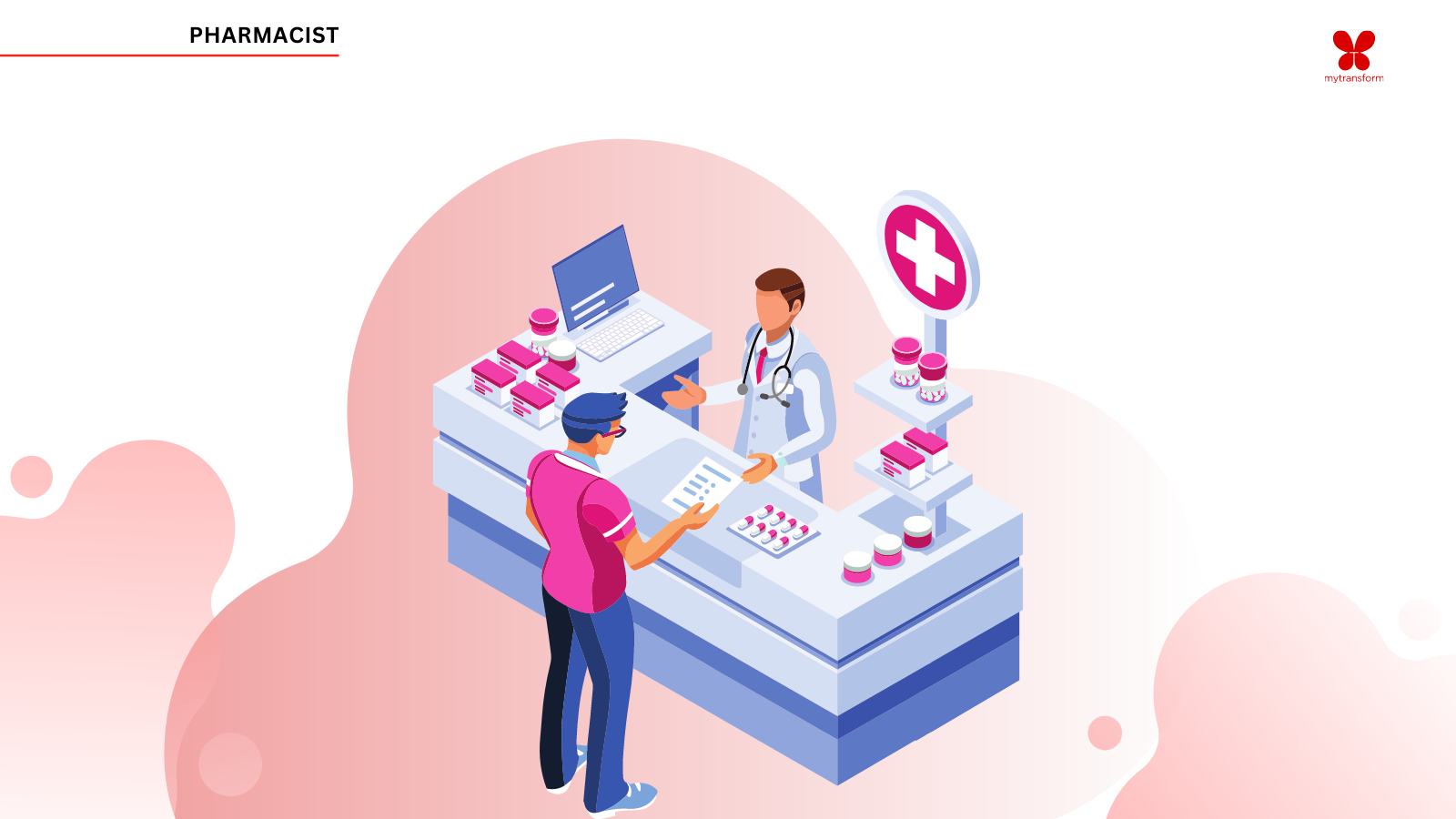
A Pharmacist is an integral part of human society and the medical profession. It takes years of academics, and internships, and finally get to be professionally employed. This article provides all the details for the question “How to become a Pharmacist in India?”.
Pharmacists are healthcare professionals who mainly work around drugs and medicines administered for patient care.
It should not be confused with pharma science is all about chemistry and chemicals related to medicines. Pharma students study medicines, dosage, composition, and administration to different ailments.
This article provides all the required details related to the education required to become a Pharmacist, how many years to be a pharmacist, pharmacist qualifications, pharmacist education, scope of pharmacy, minimum training required for a pharmacist, pharmacy course eligibility, how to get pharmacy license in India, pharmacist salary in India, role of pharmacist, and more.
Who is a Pharmacist?
A Pharmacist is a healthcare professional who dispenses medications on doctor’s prescriptions. They advise patients on the safe use of medicine with the aim to prevent diseases and promote public health. Pharmacists are academically qualified professionals and serve as primary caregivers in the healthcare industry.

Trusted by 77,000+ Students
Take the first step towards your dream career.
Kick start your career today!
Types of Pharmacists
1. Community Pharmacists –
They work in and maintain the pharmacies. They are also known as Retail Pharmacists and generally fill prescriptions for patients over the counter.
2. Speciality Drug Pharmacists –
They specialize in administering medicines for complex diseases and usually work directly with doctors.
3. Ambulatory Care Pharmacist –
These Pharmacists specialize in administering medicines in patient care such as dialysis, therapies, etc.
4. Informatics Pharmacist –
These Pharmacists are in non-patient medicine handling. They integrate technology in medicine storage, distribution, and measurement.
5. Hospital Pharmacists –
They work in hospitals or affiliated pharmacies. They generally fill doctor prescriptions for inpatient care.
6. Nuclear Pharmacists –
They handle medicines that contain nuclear materials. They use drugs in combination with radiological equipment and treat severe illnesses like cancer.
7. Home Care Pharmacists –
These pharmacists administer medicines in-home settings. They also specialize in nutritional administration.
8. Veterinary Pharmacists –
Vet Pharmacists fill medicine prescriptions for pet and animal care.
9. Research/Academic Pharmacists –
Academic Pharmacists work as lecturers in universities and colleges. They can also work in academic research.
Skills Required to Become a Pharmacist
- Good Communication and Interpersonal skills
- Understanding of Clinical terms
- Ability to multitask
- Integrity and Compliance
- Great attention to detail
- Basic computer skills
Roles and Responsibilities of a Pharmacist
- Pharmacists work with doctors, nurses, and specialists by providing prescribed drugs to administration.
- They fill prescriptions, advise generic drugs for minor health concerns, and sell over-the-counter medicines.
- They ensure quality drugs are provided for patient care.
- They advise patients on how to take medicine, and side effects, and address their concerns.
Eligibility to Become a Pharmacist
- Completed +2 or 12th standard in the Science stream with biology as the main subject.
- 2-year Diploma in Pharmacy (D.Pharm.) course or
- 4-year Bachelor of Pharmacy (B.Pharm.) program in different specializations like Pharmacology, Pharmaceutical Chemistry, Pharmacognosy, Ayurveda, etc.
- 2-year Master of Pharmacy (M.Pharm.)
- 2-year Post Graduate Diploma in Pharmacy (PGDP)
How to Become a Pharmacist in India? A Step-by-Step Guide
Here is a step-by-step guide to becoming a Pharmacist in India.
- After completing 10th, aspiring candidates must take up 12th standard in the science stream with biology as the main subject.
- Candidates must enrol in Bachelor in Pharma (B.Pharm.) or Diploma in Pharmacy (D.Pharm.) course in an Indian institution.
- Some Pharmacy institutions require candidates to clear entrance examinations to secure admission to Bachelor’s program.
- After completing the bachelor’s program, candidates can study further by enrolling in a Master’s program in different specializations.
- After completing either bachelor’s or Masters’s in Pharmacy, candidates should select the industry they need to work in.
- Pharmacists can work in different companies involved in Pharmaceuticals, Pharma distributors and retailers, Research organizations, and institutions.
Specializations in Pharmacy
- Pharmaceutics
- Pharmacology
- Pharmaceutical Chemistry
- Pharmacognosy
- Biopharmaceutics
- Clinical Pharmacy
- Cosmeceuticals
- Biopharmaceutics
- Pharmaceutical Biotechnology
- Phytomedicine, etc.
Career Scope of a Pharmacist
The career growth of a Pharmacist greatly depends on the education of the candidate. Some of the popular designations of a Pharmacist are.
- Hospital Pharmacists
- Pharma Scientist
- Pharma Sales Representative
- Drug Quality Analyst
- Retail Pharmacist
- Drug Inspector
- Computational Pharmacist, etc
Salary of a Pharmacist in India
The average salary of a Pharmacist in India is INR 6 LPA. The entry-level salary of a Pharmacist ranges from INR 3 LPA to 4.5 LPA depending on academic accomplishments. Depending on the experience and specialization, the salary of a Pharmacist ranges up to INR 15 LPA. Top industries hiring Pharmacists are Hospitals, Drug retailers and distributors, Pharma manufacturers, etc.
Top Pharmacy Colleges in India
Here is a list of a few top colleges to get a Pharmacy degree:
- Manipal College of Pharmaceutical Sciences, Manipal
- JSS College of Pharmacy, Ooty
- Oxford College of Pharmacy, Bengaluru
- Shobhaben Pratapbhai Patel School of pharmacy, Mumbai
- SRM College of Pharmacy, Kanchipuram
- Poona College of Pharmacy, Pune
- JSS Academy of Higher Education and Research, Mysuru
- Banasthali Vidyapith, Jaipur
- Institute of Pharmacy, Nirma University, Ahmedabad
- Bombay College of Pharmacy, Mumbai
Pros and Cons
Pros of Being a Pharmacist are:
- Job security
- Less stressful in the medical field
- Good work environment
- Opportunity to work part-time while studying
Cons of being a Pharmacist are:
- It is a repetitive and boring job
- Low salary and compensation
- Needs to stand and work for long hours
Summary
- A Pharmacist is an integral part of a healthcare system. They mainly deal with drugs and medicines for patient care.
- Pharmacy is a unique career option and less stressful in the medical profession. A lot of skills need to be cultivated over academics to be good at pharma subjects.
Frequently Asked Questions
After completing the 12th standard, aspirants can work as retail pharmacists by completing Diploma in Pharmacy (D.Pharm.). However, it takes 4-6 years to become a Pharmacist to find work in bigger industries.
Pharmacy is a difficult subject to study. It needs higher knowledge of chemistry.
NEET Examination is not required to secure admission to Pharmacy courses.
Taking a 4-year B.Pharma course is the best option to pursue a career in Pharmacy.
Mathematics is not necessary to study B.Pharma. However, Chemistry and Biology are must subject in 12th standard.
Compared to MBBS, Pharmacy is an easy course to study and also takes less time to complete the bachelor’s course.
B.Pharma is a better option to become a Pharmacist since it offers a wide range of specializations. It can also be a stepping stone for higher education.
A pharmacy license is provided by state governments through their drug regulatory department. To understand how to become a Pharmacist in India and become a successful Pharmacist read the article above.




